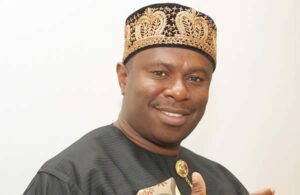Imo on the precipice
by Dakuku Peterside
The mayhem in the Eastern Heartland of Imo State has left everyone perplexed. Security eruptions in Imo state appear to be an indicator of what the country is turning to. The state’s stories seem like scenes from blockbuster sci-fi movies meant to entertain fans in love with gory violence. A few months ago, such scenes could not be imagined even by diehard pessimists in the state. But these have become the existential realities of citizens of Imo State today.
A few days ago, an armed gang kidnapped a traditional ruler, His Royal Highness, Eze Charles Iroegbu and all the cabinet chiefs of Nguru Mabise on their way back from a wedding ceremony. Unknown hoodlums attacked the Ehime Mbano police station barely 48 hours after Vice President Yemi Osibanjo, the former inspector general of police, Mohammed Adamu, and other government functionaries visited the state to inspect a similar attack on the state correctional facilities and Police in Owerri.
In the early hours of Monday 5th April 2021 (Easter Monday), gunmen attacked Owerri Correctional Centre (Prisons) and freed over 1,800 inmates. This was after setting virtually all the vehicles in the prison vicinity on fire.
The then Inspector-General of Police, Muhammed Adamu, released a statement later in the day blaming the attack on the outlawed Indigenous People of Biafra (IPOB). No investigation and no briefing preceded the announcement. The police chief accused IPOB of masterminding previous attacks on security officers and facilities in the South East and South-South region. He argued that who else has that level of sophistication and organisation to mobilise and attack security agencies continuously and succeed apart from IPOB? It is alleged that an IPOB Pastor was arrested and paraded, which may have gotten IPOB members angry.
However, in a separate statement, the Governor of Imo State, Senator Hope Uzodinma, blamed the recent attack on security facilities in the state on aggrieved politicians, saying they aimed to destabilise his government and that of President Muhammadu Buhari. In an interview with Channels TV, Uzodinma claimed that the incident was an attack on his government and explained that security agencies had gathered intelligence on the sponsors of the thugs and their planning leading to the attack on government establishments on Monday. Beyond the contradictory statements between the Chief Law Enforcement Officer in the Country and Chief Security Officer of Imo State, the details of the alleged jailbreak and attack on the Imo State Command HQ of the Nigeria Police looks like a poorly scripted drama. According to reports, the gunmen allegedly danced and sung solidarity songs for more than 30 minutes before attacking the facilities, located within the Imo State Police Command Headquarters’ compound. The incident witnessed no fatality except for an escaping prisoner that seemed to have been a victim of a stray bullet.
So, it means that in the attack on a Correctional Centre facility purportedly secured by heavily armed correctional officers and located at the heart of the Nigerian Police in Imo State, not even one of the purported attackers/gangsters was shot or killed. And not even one prison warder or a single policeman was shot or killed.
Some reports also indicated that there is usually an Army Armoured Personnel Carrier (APC) manned by stern-looking soldiers, at the entrance of the Government House, the Correctional Centre , and the High Court premises, all within touching distance of the scene of the mayhem. Yet, there was no apparent effort to repel the arsonists and hoodlums.
Equally more puzzling is that the formidable military formation, called 32 Field Artillery Brigade, is located less than 10 minutes away from the Owerri Correctional Facility. Yet, the soldiers failed to respond to the attack, which is said to have lasted for over 3 hours.
A former Assistant Director with DSS alleged that the secret police alerted the Nigerian Police and Imo State governor at least three times before the gruesome attack on the state prisons that fateful day, yet nothing happened.
These anomalies point to the fact that there seems to be more to the ‘Prison Break’ than meets the eye. As our security agencies strive to uncover what happened at the wee hours of Monday, 5th April 2021,at Owerri Correctional Facility, it should be a thing of worry for Nigerians that the whole country is gradually being overwhelmed by insecurity and overran by criminal elements.
Imo State, for instance, has witnessed more than five attacks on security formations in the past months. In recent times, the South East has become a morbid theatre where security men are randomly murdered. Many Nigerians have wondered the fate of the ordinary, unarmed, defenceless Nigerian if those with arms to protect the unarmed are themselves killed at random.
We must ask pertinent questions at this point: who wants to destabilise Igboland and for what? What happened to intelligence gathering and analysis by the security agencies and air surveillance ? Is it true that one of the eastern agitation organisations trained over one thousand youths within the country, yet they were not spotted, not detected, nor arrested? Has the whole insecurity issue been turned into an economic enterprise? How come in other climes, it is straightforward to trace mass action and nip it in the bud? Are there lessons we should take from FBI and Shinbeth organizations of US and Israel respectively on intelligence gathering and analysis?
It has been reported that weapons are freely coming into the land and in non-state actors’ hands. There is the broader narrative of ethnic nationalism and sympathy towards separatist movements, which exacerbates the problem. These acts of violence have significant implications for the broader issues of national security. It almost seems as if violence is being franchised from one part of the country to another.
It has become apparent that something is seriously wrong with Nigeria’s security architecture. We seem to have a problem getting the right policy to tackle insecurity and taking the proper steps to safeguard Nigerians’ lives.
We cannot make progress as a country if we persist with the culture and climate of impunity. The Owerri ‘Prison Break’ is a severe security breach as thousands of dangerous criminals were released into society with catastrophic consequences.
But as we know, with our beleaguered country, in the end, it is unlikely that anything will change. The Head of the Owerri Correctional Centre will continue in office. The prison officials who were supposed to ensure that hoodlums did not gain access to the prisoners would continue to receive all their salaries and emoluments. Simultaneously, the soldiers manning the armoured personnel carrier will return to their duty post. No one resigns. No one is demoted. No one is sacked. No one takes responsibility. When the ‘fire’ of the incident eventually dies down, we continue as if nothing happened.
In ‘saner climes’ last week’s incident at the Owerri Correctional Facility would cost many people their jobs. By the way, it is a fact that there are places in the world where the need for political responsibility would mean that such institutional failures can bring down an entire government.
The South East used to be one of the most peaceful geopolitical regions in the country. Still, in the past few months, it has been gradually degenerating into a bastion of insecurity. It is imperative to note that this area’s security situation became worse since the IPOB, designated a terrorist organisation by the federal government, announced the formation of the Eastern Security Network (ESN). Ostensibly formed to tackle the menace of Fulani herders, ESN is an unworkable security arrangement that would only spell more problems for the South East and may plunge the region into anarchy.
The Amotekun in the South West is backed by law, gets adequate funding from the South West’s governors, gets security training from Nigeria security agencies, and collaborates with them in their duties. Conversely, the ESN has no legal backing, no determinable source of legal funding and cannot work with security agencies. They are seen as a military unit of a terrorist organisation.
How can such an outfit provide sustainable security when they can hardly identify themselves in public? If they apprehend a criminal, what would they do with such a person since they cannot hand them over to the police or other security agencies? How can an outfit in permanent conflict and confrontation with Nigerian security agencies help tackle insecurity in an area?
There have been reports that the constant attacks on security formation and security personnel in the South East have led to a situation whereby criminals now roam free. It is alleged that the police and other security personnel refuse to answer distress calls from members of the public for fear of their lives.
This is a clear case of degeneration to anarchy. Suppose security agencies are overwhelmed, and the government cannot develop a workable strategy to reign in hoodlums and criminals. In that case, it is a sign of a dangerous movement towards the precipice. Unfortunately, some South-East political leaders have chosen not to speak out against this descent to anarchy in their local communities. Some of them, especially those who belong to opposition political parties, probably think that the more these attacks persist, the more the government at the centre gets more unpopular and the better the opposition party’s prospects in the next election.
This kind of thinking and disposition will lead to catastrophic consequences in the long run. It is exactly the playbook of Boko Haram replaying before us. When the bloodthirsty Islamic group started killing police officers and attacking security installations in the North East, some politicians saw the situation as an opportunity to settle scores with the then government and refused to speak up. It is now almost six years, and the Boko Haram menace is only becoming direr by the day.
The government must protect the lives and properties of the citizenry. Our security agencies should be more serious with intelligence gathering and investigation. They should do everything possible to fish out the perpetrators of the killings and mayhem in the South East, and they should be made to face the full wrath of the law. The DSS should live to their billing by providing credible and actionable intelligence so that these hoodlums intent on destabilising the South-East would be unmasked and their attacks nipped in the bud.
No matter their misgivings with the government at the centre, political leaders and elders in the South-East should firmly condemn the attacks on security personnel and security installations. They should encourage local communities to expose the perpetrators who are in their midst. These steps are necessary to avoid the gathering storm, the macabre dance that may set us on the road to Rwanda or Somalia.



